- Home
- Sharyn McCrumb
If I'd Killed Him When I Met Him
If I'd Killed Him When I Met Him Read online
“(A) SHARP-EDGED, WITTY TALE …
Buoyed by intriguing characters, a wry wit, and lush Virginia atmosphere, McCrumb’s mystery spins merrily along on its own momentum, concluding that justice will triumph … but in surprising ways.”
—Publishers Weekly
“Elizabeth’s eighth outing has it all—a gaggle of tidy mysteries, nonstop laughs, bumper-sticker wisdom about the male animal, and some other, sadder kinds of wisdom, too. Quite a banquet—if you don’t mind all that arsenic.”
—Kirkus Reviews (starred review)
“Whenever Sharyn McCrumb suits up her amateur detective, Elizabeth MacPherson, it’s pretty certain that a trip is in the offing and that something deadly funny will happen.”
—The New York Times Book Review
“McCrumb has an exquisite sense of the ridiculous: she creates a New Age version of the Mad Hatter’s tea party that will induce tears of laughter as she neatly skewers academia.”
—Richmond Times-Dispatch
“A terrific tale … Lots of feminist folklore is coupled with plain old fun as the lawyers and MacPherson do their damnedest to defend their clients.”
—Trenton Times
“She’s Agatha Christie with an attitude; outrageous and engrossing at the same time.”
—Nashville Banner
“Contains the author’s trademark rapier wit … Only a writer as accomplished as Sharyn McCrumb can so skillfully marry farce and tragedy with such rewarding results.”
—The Gainesville Sun
“A delightfully entertaining, uniquely plotted story.”
—Booklist
“McCrumb is a fine writer with an eye and ear finely tuned to the ever-frazzling relationships between the sexes.”
—St. Petersburg Times
“McCrumb’s ability to write in a variety of styles—crossing genres, mixing the comic with the serious—makes her one of the most versatile crime authors on the contemporary scene.”
—Booklist
“Sharyn McCrumb is definitely a star in the New Golden Age of mystery fiction. I look forward to reading her for a long time to come.”
—ELIZABETH PETERS
“IF I’D KILLED HIM WHEN I MET HIM … is sheer pleasure. The book moves like a streak and all the storylines are fascinating. To tantalize you further, let me say that this story has the most unusual sexual scene in the world of mystery literature.”
—Romantic Times
By Sharyn McCrumb:
The Elizabeth MacPherson novels:
SICK OF SHADOWS
LOVELY IN HER BONES
HIGHLAND LADDIE GONE
PAYING THE PIPER
THE WINDSOR KNOT
MISSING SUSAN
MACPHERSON’S LAMENT
IF I’D KILLED HIM WHEN I MET HIM…
THE PMS OUTLAWS
IF EVER I RETURN, PRETTY PEGGY-O
THE HANGMAN’S BEAUTIFUL DAUGHTER
SHE WALKS THESE HILLS
THE ROSEWOOD CASKET
THE BALLAD OF FRANKIE SILVER
BIMBOS OF THE DEATH SUN
ZOMBIES OF THE GENE POOL
FOGGY MOUNTAIN BREAKDOWN
Books published by The Random House Publishing Group are available at quantity discounts on bulk purchases for premium, educational, fund-raising, and special sates use. For details, please call 1-800-733-3000.
To
Deborah Adams,
with thanks for the title, which she
overheard from a battered woman:
“If I’d killed him when I met him,
I’d be out of prison now.”
Pray do not, therefore, be inducted to suppose that I ever write merely to amuse, or
without an object.
—Charles Dickens
When the Himalayan peasant meets the he- bear in his pride,
He shouts to scare the monster, who will often turn aside.
But the she-bear thus accosted rends the peasant tooth and nail
For the female of the species is more deadly than the male.
—RUDYARD KIPLING
ON THE FIRST morning of her husband’s lingering death, Lucy Todhunter came down to breakfast alone. She explained to the houseguests—Mr. Norville from the railroad and her North Carolina cousins, the Compsons—that her husband was not feeling well, and that she would take some nourishment up to him on a tray.
“He’s such an old bear when he’s sick,” she said, with a little laugh, as she sat down to a bowl of porridge and cream. “I can’t think how he made it through the inconvenience of the war.” This unfortunate reference to Philip Todhunter’s military infamy (i.e., serving in the Union Army during the Late Unpleasantness) brought furrowed frowns to the faces of the Compson cousins. Lucy blushed and said, “I do beg y’all’s pardon. My mind is on my husband, not my manners.”
Still, her appetite and the gaiety of her table talk suggested that she was not unduly concerned about Philip Todhunter’s illness. Lucy’s long hair was artfully arranged into a chignon, with not a single hairpin showing, and her cheeks were smooth with rice powder. She wore a morning dress of faded green silk, carefully darned here and there on the long skirt, but still serviceable. Lucy’s attire favorably impressed Cousin Mary Hadley Compson of Maysville, North Carolina, who was later to say grudgingly: “Even though Lucy married a carpetbagging Yankee so soon after the war, she didn’t put on airs with their new money.” Of course, the imported Spanish mahogany dining-room table with seven extra leaves and a dozen matching chairs upholstered in crimson Moroccan leather might be considered showy. The drawing room, shining with a green satin suite and matching portieres, boasted a semigrand pianoforte in walnut by Collard & Collard of England that had cost a pretty penny. But that was keeping up appearances. A prominent man of business needed such a showpiece. There would be no illusions in local society about whose pride was on display. Mr. Todhunter was householder, and any Mrs. Todhunter he cared to install, merely housekeeper.
Lucy Todhunter was generally conceded to be a sensible woman, even by those who had reason to dislike her. Her Todhunter in-laws disliked her very much, indeed. When Philip, formerly a major in the Union cavalry, returned to Virginia two years after the war to start a textile business with cheap land and even cheaper labor, his relatives approved, boasting of Philip’s reputation as a shrewd and unsentimental man of business. When ten months later, Major Todhunter married a honey-haired Southern beauty less than half his age, and proceeded to furnish a new home near Danville with furniture imported from England, they declared that Philip had gone native, and that the torrid Southern weather had unhinged his judgment.
Lucy went on smiling, and adding cordial postscripts to his letters back to Maine, inviting her dear new kinfolk to come and visit them. (If nothing else, the excursion would have set them straight about the climate of piedmont Virginia, but the offer was not accepted.)
Lucy had been orphaned by the war, but she came of good family and could claim even a North Carolina governor a few branches down in the family tree. An only child, she had inherited the graceful house of her childhood and the many acres that surrounded it, but very little money. At fifteen the orphaned Lucy had gone to live with her godparents in Danville, and with vague affection for the pretty but reticent child, they had given her a home and completed her genteel upbringing. At seventeen she knew how to manage a house, how to play the pianoforte to accompany her own singing, and how to comport herself gracefully in good society, even if her acquaintance with formal education had been slight by Todhunter family standards.
She had met Philip through mutual friends on one of his visits to Danville. A few months later, he chose that river cit
y in which to establish his new business, perhaps influenced by the presence of the young and lovely Miss Lucy Avery. By the simple expedient of joining the correct church and making substantial contributions to it, Todhunter had persuaded the local gentry to overlook his unfortunate past connection with the Union Army. Ensconced among the “right” people, he had pursued his acquaintance with young Lucy Avery at formal dinners and garden walks.
Her godparents had been taken aback when eighteen-year-old Lucy announced her engagement to the stern and charmless Major Todhunter, but they told themselves (and those who tactfully inquired) that the war was, after all, over, and that one had to give poor orphaned Lucy credit for realizing that someone would have to support her. They reasoned that being forced to choose between congeniality and prosperity, Lucy had taken the wiser course. Whether or not this prudence brought her happiness in her eighteen months of marriage was a source of considerable speculation in Danville society, but no one really knew.
Lucy had been taken ill a few months after the wedding, and so ill again six months later that she had been sent to the Montgomery White Sulphur Springs resort in the shadow of the mountains just east of Christiansburg, Virginia. Fears that the young bride had come down with consumption were curtailed in hushed whispers by her godmother: Lucy had lost a baby, each time in the second month of pregnancy. She emerged from each illness more frail and slender than ever, but she kept her beauty, and her spirit was not broken. There were also rumors that Philip Todhunter was a harsh and exacting husband, but no word of complaint was ever heard from his wife. Lucy Avery had never been given to confiding in her acquaintances.
“Too bad that Philip is feeling seedy,” Richard Norville remarked, helping himself to eggs and fried kidneys. “I hope it wasn’t the lateness of the hour that indisposed him. We were quite a time with our brandy before the fire, refighting the war, you know.” He smiled at his fellow guests, whose composed expressions did not reveal what they thought of boastful drunkards who gloated over their victories. The Compsons glanced at each other, and went back to their porridge without a word. The more they saw and heard of Lucy’s husband and his friend, the shorter their intended stay became.
“But how are you, Lucy dear?” asked Mary Compson. It seemed to her that after two miscarriages in a year, Lucy ought to be the one to take to her bed.
“Oh, I can’t complain,” said Lucy with a wan smile.
Norville, who had failed to interpret this coded feminine message, said, “Haven’t caught the grippe from your husband, I hope.”
“Philip’s digestion has been plaguing him lately, that’s all,” said Lucy with her sweetest smile. “It’s all that rich food he will have Cook prepare. He’s paying for it now, though. I haven’t been able to get him to eat a thing since Sunday. I don’t suppose that it helped him any to indulge in brandy at all hours with you, Mr. Norville.” Lucy smiled to take the sting out of her reproach. “I shall take up a tray to poor Philip directly. A bit of beef tea and one of Cook’s wonderful beignets may tempt him to eat. Have you all tried them? They’re simply lovely.” She picked up one of the square pastries and bit into it, dislodging a small puff of powdered sugar, which floated downward and settled on her bodice. Lucy blushed. “Well, laws, they are a bit untidy, but so delicious. Philip generally has one for his breakfast, you know. He acquired the taste when he was stationed with the army in New Orleans. Perhaps I can persuade him to try one now.”
Her guests each took a pastry from the silver plate. Lucy picked up the pitcher of unsweetened grape juice and poured each guest another glassful. Then she drank hers down and set the plate of beignets on a large silver serving tray beside the bowl of beef tea, saying, “I shan’t be a moment, my dears. Do go right on eating.”
Richard Norville was on his feet in an instant. “Let you carry that heavy thing, ma’am?” He beamed at his shapely young hostess. “Not while I know it.” So saying, he snatched up the footed silver tray and nodded for her to show him the way, which she did, with much simpering about his gallantry.
They went up the stairs, stopping outside the closed door of Philip Todhunter’s bedroom. Lucy tapped softly and called out that dear, kind Mr. Norville had graciously carried up Philip’s breakfast tray, and that he proposed to pay his respects to his ailing friend.
“Let him come in then,” growled a voice from the other side of the door. “I’m not contagious.”
As cheerfully as ever, Lucy eased open the door, bustled over to her husband’s bedside, and bestowed a wifely peck on the cheek of the invalid, who scowled at her. “Is that my juice?”
“Yes, dear,” she replied. “But do try to eat something as well, won’t you?”
“Stop clucking over me,” said Philip Todhunter, waving away the beef tea. “You know I can’t touch that muck, Lucy.” He reached for a sugared beignet from the pile on the plate. He was a dark-eyed man, lean of feature, with a sallow, waxy complexion beneath a graying beard. He had never been handsome, but prosperity had given him a certain air of distinction, now lacking in the querulous invalid before them.
Richard Norville began to regret his gallant gesture. “See here, Todhunter,” he said in the gruff voice that signifies embarrassment, “I can go if you’re not up to receiving visitors, but hadn’t we better have the doctor round to look at you?”
“I can manage without one, thank you,” said Todhunter, holding up his pastry in a mock salute. “I haven’t eaten in a day and a half. Starve a fever, they say. Better than the quack remedies you get from the medicos.”
“Is it the grippe, do you think, Todhunter? Or worse?” Norville edged away from the bed.
“I feel like the little Spartan boy who put the fox in his tunic,” said Todhunter. “Even now it gnaws through my vitals seeking egress. And there is a numbness in my limbs, worsened by this cursed cold.”
Norville raised his eyebrows. The weather was quite mild, in fact, and there was a coal fire in the grate; but he did not care to argue with a man who was suffering. “Well, I hope you throw it off soon,” he said.
Dutifully, Lucy sat down in the chair beside the invalid’s bed and patted his hand. “Do let me know if you would care for anything else,” she murmured. “I worry so.” Absently, she broke off a bit of her husband’s pastry and nibbled on it.
Her husband finished the rest of it and sank back against the pillows with a sigh. “I feel like Death’s orderly,” he remarked to Norville, wiping his sugared mouth against the back of his hand. “But perhaps a bit of nourishment will do me. It always does, doesn’t it, Lucy dear?”
She nodded, looking distressed. “Philip—”
“That will do, Lucy. Norville and I have business to discuss.” He leered up at her. “Isn’t she lovely, Norville?”
“The flower of Virginia womanhood,” said the railroad executive with borrowed gallantry. He had heard the phrase used by a Southerner at a party once, and he’d committed it to memory. Apparently, these people expected you to say things like that.
Lucy smiled uncertainly. “Is there anything else I can get for you, Philip?”
“No,” he said without looking up. “Norville, did you bring the papers?”
“You will drink your beef tea, won’t you, dear? It will give you strength.”
“Damn the beef tea!” shouted Todhunter, slamming his fist against the tray and spilling the contents of the bowl. Tray, bowl, and pastries tumbled to the carpet. “Can’t you see you’re not wanted …?” His words trailed off into a howl of pain as he doubled over in the bed, clutching his abdomen.
Norville watched his friend in silence for a moment, and then turned to the pale young wife. She had poured herself some grape juice in Philip Todhunter’s crystal tumbler, and she was sipping it in an abstracted way, her hands trembling as she lifted it to drink. “Mrs. Todhunter,” said Norville, “whatever your husband may say to the contrary, his illness is grave. Either you summon a physician, or I will.”
MACPHERSON & HILL
ATTORNEYS-AT-LAW
DANVILLE, VIRGINIA
(Pardon the stolen stationery. Elizabeth.)
Dearest Cameron:
I’m back in Virginia, instead of in Scotland, because the remnants of my family still seem to need the presence of a sane person, and since we aren’t related to such a being, I am having to impersonate one. It’s probably good therapy for me anyhow. There’s a very earnest psychiatrist named Freya (no wonder she went to med school: intellectual parents) who insists that no matter what my feelings are, I do not need solitude right now. She uses words like brooding and self-pity and clinical depression. I have pills to take, but they might as well be Reese’s Pieces, because they certainly aren’t cheering me up any. But I take them anyhow, in case they happen to be working, which means I’d be even worse without them. At least I have things to keep me occupied here.
Besides, there’s a limit to the amount of time one can stand on the shore at Cramond, staring out at the dark water of the firth.
Freya says it’s all right for me to write to you. Therapeutic, she called it, in that smug little way of hers. It must be wonderful to be a shrink. I can’t think why I became a forensic anthropologist. Anytime you disagree with Freya, she just smirks and says that you are “in denial,” and therefore she gets to be right all the time. It’s maddening—which drums up more business for her, I suppose. Why do the rural good old boys bother to stage cockfights when they could put two psychiatrists in a pit and watch a real bloodbath?

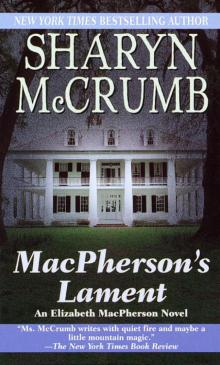 Elizabeth MacPherson 07 - MacPherson’s Lament
Elizabeth MacPherson 07 - MacPherson’s Lament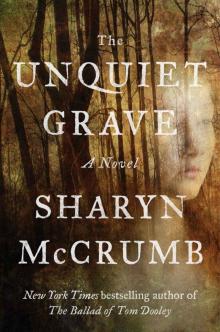 The Unquiet Grave: A Novel
The Unquiet Grave: A Novel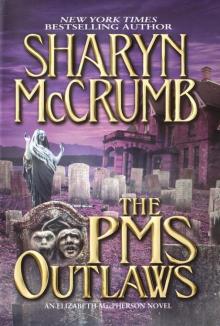 The PMS Outlaws: An Elizabeth MacPherson Novel
The PMS Outlaws: An Elizabeth MacPherson Novel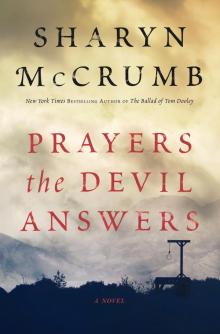 Prayers the Devil Answers
Prayers the Devil Answers Paying the Piper
Paying the Piper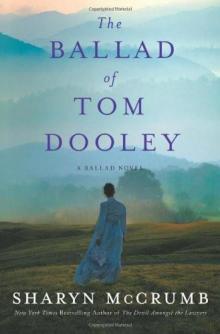 The Ballad of Tom Dooley: A Ballad Novel
The Ballad of Tom Dooley: A Ballad Novel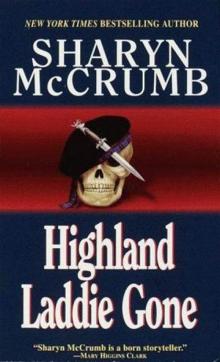 Highland Laddie Gone
Highland Laddie Gone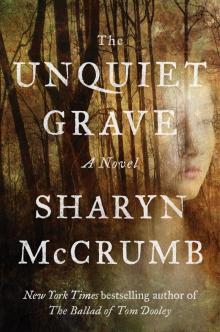 The Unquiet Grave
The Unquiet Grave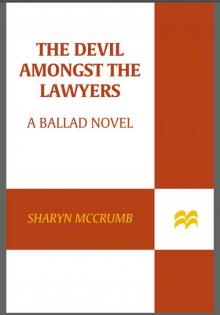 The Devil Amongst the Lawyers
The Devil Amongst the Lawyers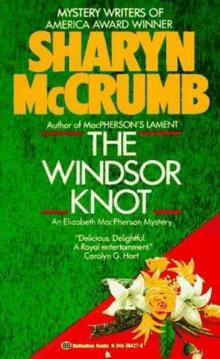 The Windsor Knot
The Windsor Knot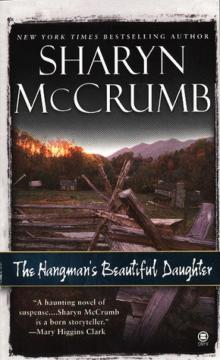 The Hangman's Beautiful Daughter
The Hangman's Beautiful Daughter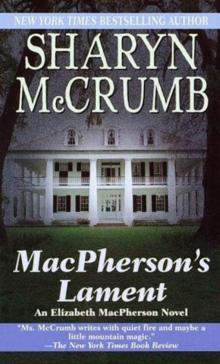 MacPherson's Lament
MacPherson's Lament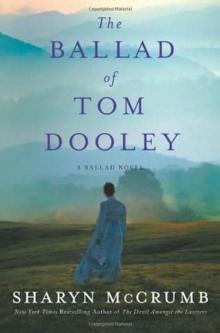 The Ballad of Tom Dooley
The Ballad of Tom Dooley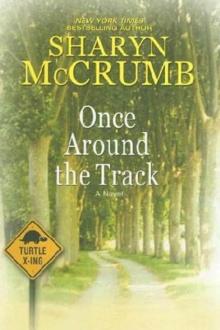 Once Around the Track
Once Around the Track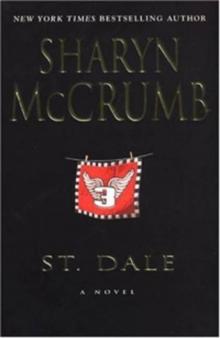 St. Dale
St. Dale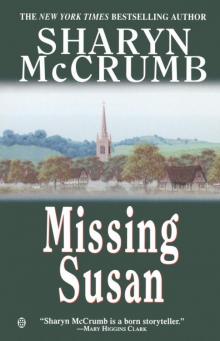 Elizabeth MacPherson 06 - Missing Susan
Elizabeth MacPherson 06 - Missing Susan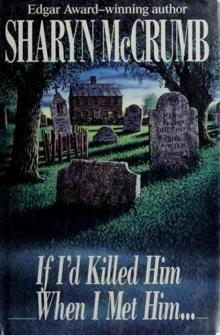 If I'd Killed Him When I Met Him…
If I'd Killed Him When I Met Him…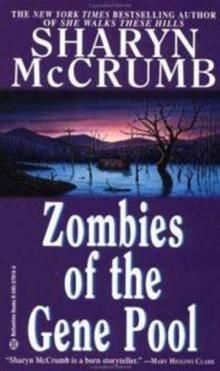 Zombies of the Gene Pool
Zombies of the Gene Pool Bimbos of the Death Sun
Bimbos of the Death Sun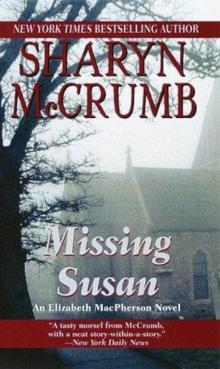 Missing Susan
Missing Susan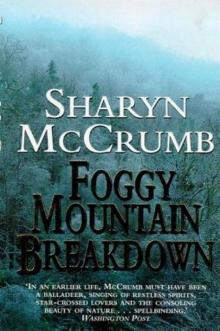 Foggy Mountain Breakdown and Other Stories
Foggy Mountain Breakdown and Other Stories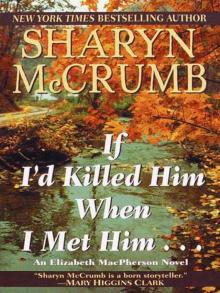 If I'd Killed Him When I Met Him
If I'd Killed Him When I Met Him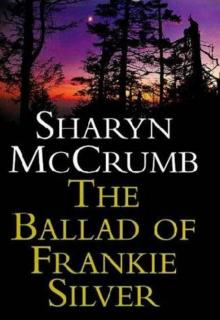 The Ballad of Frankie Silver
The Ballad of Frankie Silver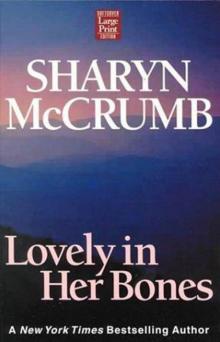 Lovely In Her Bones
Lovely In Her Bones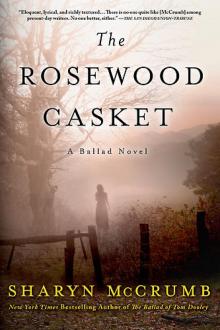 The Rosewood Casket
The Rosewood Casket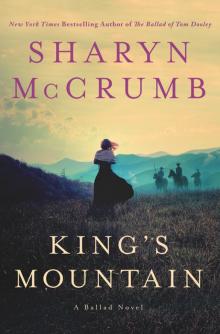 King's Mountain
King's Mountain